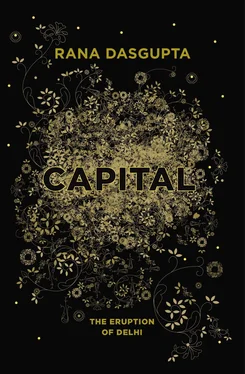“If you want to know the personality of this city of Delhi, go to Kashmir or the north-east and see what happens under Delhi’s orders. India only holds onto those territories by military brutality, intimidation and rape. If there were any rule of law, whole jails would be full of the Indian soldiers who have raped and mutilated. Including members of my own family, who have given the orders. But they are protected by the Armed Forces (Special Powers) Act. Of course this is antithetical to the constitution, which guarantees the right to life. But it doesn’t matter anymore because there is no rule of law. This is a completely lawless society. Nobody is accountable to anybody. The people who run this country are all lawbreakers.”
Jaswant’s horror at what surrounds him was crystallised during the Sikh attacks of 1984, which did not pass by people like him. Delhi people had always sought out positions and connections to insulate themselves from the wildness of things, but the mobs of 1984 were willing to take on any Sikh target, no matter how powerful.
“After Indira Gandhi’s assassination, with the encouragement of the press and politicians, not less than 15,000 Sikhs were killed in Delhi. The official figure was 3,000, but it was far more than that, and it happened in the most brutal way possible.
“The petrol station my family owned next to the Imperial Hotel was surrounded and they were threatening to burn it. The manager called to tell me what was going on and I said, ‘Why don’t you call the police?’ and the manager said, ‘The police are the ones who are doing it!’ Eventually the crowd was dispersed by shots fired from the Imperial Hotel.
“I was alone in the house with my kids. Hindu friends came to stay with me to help us. They knew what kind of state I was in, and they wanted to make sure I didn’t do anything stupid. I gave way to self-harming behaviour. I decided to cut my own hair off rather than have state-sponsored goons do it. I smashed my parents’ crystal and cut my hair off. I still have the hair.
“I lost faith in everyone. Including my friends who were trying to help but whose behaviour I found patronising. I was from Delhi and they were from outside. Who were they to protect me? My family built this damn city. I should have been protecting them.
“Two years later I was at a traffic light and my car stalled because it was cold. There was a motorcycle behind me and the rider was annoyed. He leaned in my open window and said, ‘Did you Sikhs never learn your lesson?’ There was not a hint of remorse in Hindus: they were delighted to have ‘taught us a lesson’, and they continued to display the most menacing, ghoulish behaviour.
“Another time I was walking in Connaught Place and a girl saw me in the street and asked if she could say something to me. I was afraid of the insult she was about to give me. But instead she said, ‘Can I just say how handsome you look in your turban?’ I was incredibly moved by her compliment, you can’t imagine what it meant to me.
“But in general I was outraged by the fact that no one really came out against the genocide. All around me people were trying to suck up to the Congress and they refused to say anything against what had happened. Even the Sikhs. My brother was a socialite and a businessman, and he refused to be affected by any of this. He just went along with the dirty flow of the city.
“One time, at a party at the house of an ex-army officer — a man who later killed a guy he suspected of having an affair with his wife — I got into an argument about how the press should not have said that the bodyguards who murdered Indira were Sikh. And that man said to me, very coldly, ‘You should watch what you say. You know what can happen to people like you.’
“I know those people well: the ex-army, the ex-navy, the ministers, the landowners. They’re all violent, indecent people who make a mockery of the excellent education they have had. Arms dealers, contractors, suppliers of women to powerful men, all paying each other off, getting their pound of flesh. Arms dealing has a lot of prestige in this circle because it makes you rich and you can say you’re being nationalistic, keeping the military supplied. That’s what they say. They are proud of what they do. And their wives are proud of it too: if they have to sleep with a general or somebody, they’ll do it.
“But they’re also very nervous. They escape all the time: they escape into golf and bridge. They escape to London for the weekend. Their money escapes to the Channel Islands and Switzerland and Panama. They are an effete elite. They have all had bypass operations. They all have pacemakers. They are riddled with diabetes and arthritis. They are corrupt not just in their money-making but in their bodies and souls. They’re very superstitious: their fingers are covered with stones which are supposed to protect them from evil forces, and they have little gods and goddesses in every corner of their house. Because they don’t know who they are, and their confusion expresses itself in prejudice and violence.”
Jaswant’s romance with India’s marginalised populations irritates a lot of his peers, who find it pretentious and perverse. But after what he experienced in 1984, Jaswant feels at home among such people in a way he does not among his own kind, who fill him, in fact, with the most profound despair. It is only among the poor and oppressed that he finds some reason for human optimism.
“What happened in Delhi in 1984 was an organised massacre of people and I don’t think the city has a capacity to absorb what happened. The scars don’t heal. In me, personally, the scars have not healed. The only release I have had is through my discovery of other people who have been subjected to that kind of violence — though in a much more sustained way — at the hands of the Indian state. Almost every village in Nagaland has been raped by the Indian army. Consistently. Their villages have been burnt and they have been relocated in other areas so that they are forced to encroach on other people’s territory. That produces violence. Then the state comes in with violence to stop that violence. So the north-east is a cauldron.
“When I encountered those people, I realised that my suffering was nothing compared to theirs. They have suffered immeasurably, but that is their strength, their resilience. Their hands have been cut off and their villages destroyed but they still put their high-caste oppressors to shame because they have dignity. They are capable of looking after themselves. They are brilliant. They are survivors. When everything explodes, they will survive. The elite will not, because when all this is dismantled, they will have nothing to rely upon except dignity and character, which they do not have.
“In the north-east, they know everything about their surroundings and they eat everything. There is no shortage of food. They know how to survive in famine because they know which leaves to eat, which fruits to eat. They can eat dogs, they can eat rats, and they have very good cuisine. They don’t overdo anything. And here these Hindu-type people: they can’t eat this, they can’t eat that. They are the ones really living in famine, if you ask me.
“If a natural catastrophe comes to this city, all hell will break loose. I see that coming. I see this city going into ruins, just tumbling into the dust. When an earthquake hits, when the water runs out, Delhi people will not help each other. They will slaughter each other.”
Jaswant is quite merry as he says all this.
“The other day I was sitting in my car, in the market, listening to some music. Three police cars were parked next to me and the policemen were playing cards. I got out and asked them what they were up to. They said they were protecting the son of a cabinet minister. ‘He’s come to spend some money, he’s an irresponsible, useless fellow, all he does is chase women and get drunk. We are his security team, three police cars.’
Читать дальше











